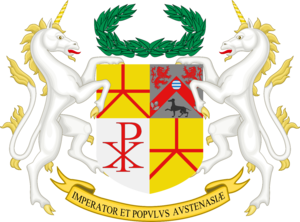Parliament of Austenasia
Parliament | |
|---|---|
| "the Emperor, Prime Minister and Cabinet [sic] are to meet..." | |
 | |
| Type | |
| Type | |
| Houses | House of Representatives |
| Leadership | |
HIM Emperor Jonathan I since 20 January 2013 | |
Lord John Gordon, Viscount of Thetford since 13 February 2024 | |
Lord Andrew, Baron of Corinium Terentium since 13 February 2024 | |
| Seats | 15 Representatives (including the Monarch and the Prime Minister) |
The Parliament of the Empire of Austenasia is the law-making branch of the government of the Empire of Austenasia. It is a unicameral legislature, comprised of the House of Representatives and presided over by the Monarch and, if not also a Representative, the Prime Minister.
A Representative is elected by each Town, City and Division in the Empire to the House of Representatives. The Prime Minister is elected by the electorate of the entire Empire out of Representatives endorsed by the Monarch in a General Election. All elections use the first-past-the-post system. There are no limits on how many consecutive terms a Representative can serve, but a Prime Minister who has served more than seven of the past eight years in office cannot stand for re-election without a vote of approval from the House of Representatives.
Although Parliament was de facto established by the 20 September 2008 Austenasian Constitution, it was not actually named as such, but rather referred to as "Government". Parliament was only fully established on 11 November 2008 after Act 11 fully codified the way in which laws would be passed.
Powers and duties
Parliament is the most powerful entity in Austenasia. Its authority is exercised through the passing of Acts of Parliament, and so its power derives from its ability to create and change the country's laws. Only the result of a referendum by the entire population holds more power in Austenasia than Parliament, as this is the only means by which the Constitution itself can be amended.
Members and structure
Parliament currently consists of fifteen people: Emperor Jonathan I as Monarch and Representative of Wrythe, Lord John Gordon as Prime Minister and Representative of Palasia, Lord İsmetcan Saraç as Representative of Chalcedon, Lord William Wilson as Representative of Nahona, The Hon. Brianna Stokely as Representative of North Nahona, Lord Michael Simpson as Representative of Procyon, Lady Addison O'Halloran as Representative of Blue Ridge, Lord Sander Koff as Representative of Oppidum Tubae, Bradley, King of the Romans as Representative of Helinium, Lord Juan Aleges as Acting Representative of Valens, Lord Michael Colquhoun as Representative of Chandler, Lord Andrew Creed as Representative of the Britain and Ireland Division, The Hon. Dr. Kalin Yanev as Representative of the Europe and Africa Division, Professor Sir Sanjib Bhattacharya as Representative of the Asia Division, and The Hon. Sir Isaiah Burdette as Representative of the New World Division.
Although the Monarch can only vote in Parliament if they are also a Representative (as is currently the case), Acts of Parliament cannot become law without Imperial Consent, that is, the approval of the Monarch granted after an Act has gained a majority vote from the House of Representatives. The Monarch also approves Candidates from among the willing Representatives to stand for Prime Minister in a General Election.
Only Representatives can be made Candidates and so stand for Prime Minister; however, as elections for Representatives and General Elections do not have to take place at the same time, it is possible that the Prime Minister could lose their office as a Representative. In such a scenario, they still remain in Parliament as Prime Minister, and are able to propose Acts to be passed, but cannot vote on them unless there is a tie; such took place when the then Crown Prince Jonathan lost his position as Representative of Wrythe in December 2011. The Prime Minister also has the power to cast a deciding vote should the House of Representatives reach a tie in voting on non-legislative business.
Representatives have the power to propose Acts of Parliament to be passed and to debate on them. The House of Representatives votes on prospective Acts of Parliament; should it vote in favour of passing an Act, it goes to the Monarch, who then decides whether or not to grant Imperial Consent and so make it law.